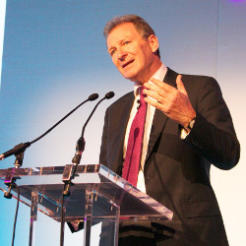Charities should be embracing transparency, and not just having it thrust upon them, the incoming chair of Pro Bono Economics has said.
Speaking at NCVO’s annual conference, former Cabinet Secretary Lord Gus O’Donnell told delegates that charities need to demonstrate very clearly how their funds are spent and what they are doing to improve “productivity at a time when government at all levels is being asked to do ‘better for less’.”
He called on charities to be transparent about pay, calling it a “necessary part of being accountable”.
O’Donnell concluded his speech saying: “These are tough times for many in our society and for many charitable and voluntary organisations. We could sit back, rein in our ambitions and wait for better times. I can see why this is tempting, but I believe it would be disastrous.
“Instead, why not use this opportunity to try different approaches to traditional problems, embracing the insights of behavioural approaches and focusing on raising our impact.
“If we do this, and embrace transparency so it is apparent we have done so, we will be well placed to succeed in a world where governments genuinely choose the best delivery vehicles based on the evidence of what works best.”
O’Donnell said that charities all need to “work on both improving outcomes and reducing costs”. He added: “If we were being really honest, we all know that there are simply too many charities and many are sub-scale.”
Charity lobbying
O’Donnell also spoke about the “inadvertent consequences of legislation that by its nature can't cover all cases and throws up some anomalies”. He said examples of this “demonstrates the importance of a body like the Lords, scrutinising new legislation in much more detail than is done in the Commons. By getting legislation right in the first place, we can prevent many problems.
“But it will never be perfect. And new problems are always arising so we need all of you to be active and vocal in passing these messages from the front line to government and to the public to create political pressure for change.”
He brought this point back to issues around charities and lobbying, and said “this is a vital channel that must not be cut off by the government's proposals designed to reduce lobbying by charities”.
The House of Lords is due to discuss the anti-advocacy clause that is being introduced to government grant contracts later this afternoon. NCVO and Acevo have issued a joint briefing highlighting the voluntary sector's concerns about the clause.
Importance of thank you
O’Donnell also referred to a recent study by the Behavioural Insights Team, where it emailed previous staff at a bank who had been donors to a fundraising campaign. It found that saying “thank you” was enough to double the number of staff members who donated, but that “the most effective message was asking staff to reach out and explain to others the impact their donations were making”.
He called on fundraisers to remember this, adding: “Saying “thank you”, even for little things, builds a virtuous circle of reciprocity, with one good turn leading to another. I now realise that when my mum instilled in me the need always to say thank you she was teaching me about behavioural responses.”









